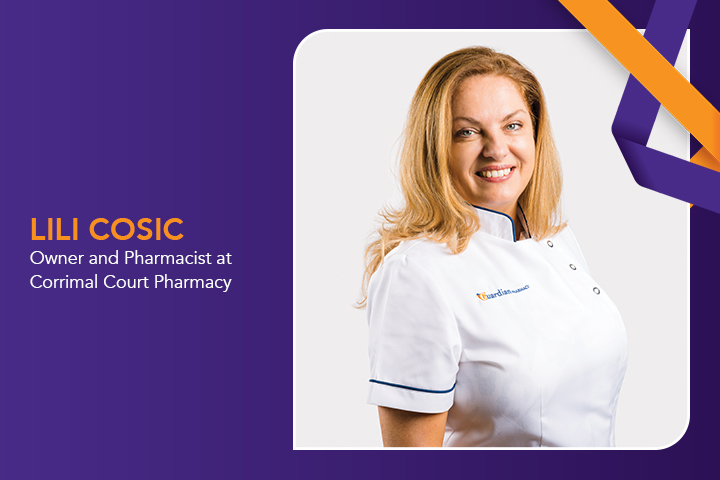
A member of Sigma Healthcare’s Amcal and Guardian National Council, Ljiljana Cosic – known as Lili – looks back on her years in pharmacy.
How did you start your career in pharmacy?
I began by studying for a Bachelor of Pharmacy at the University of Sydney. During my final year, I worked a two-week work placement at Corrimal Court Pharmacy in Corrimal, just to the north of Wollongong. When I finished my studies, I was fortunate to be offered an internship. After staying on at Corrimal Court and working there for 10 years, I had the opportunity to purchase the business – so I’m still there!
Did you have a female mentor or example?
While there were many women studying pharmacy with me at University, I met very few female pharmacists in the workplace – and even fewer female pharmacy owners. So, interestingly, my mentors were all men and I was lucky to have great teachers and role models. My gender was never a barrier to becoming a pharmacy owner.
Are there special qualities you think women offer to the profession?
When I look at women in pharmacy, I feel that we have a certain empathy and more emotional connection to our customers and work team. Traditionally, women have needed the ability to understand the needs of every member of the family. Our attention to detail is strong, as well as our ability to multitask.
How do you ‘juggle’ running a business with family responsibilities?
I’m a mum of two, and it is definitely a juggling act – especially when my children were younger. I gladly accepted family help with my responsibilities for my children and home! On a personal level, I have had to be organised and time efficient so I can balance my work and home lives.
I avoid chastising myself for not ‘doing it all’ as a mother, such as missing a school event or sporting activity. Similarly, as a pharmacy owner, I also realise that the business cannot be allowed to rule my entire life – so I’ve learnt to train and empower others to take on certain responsibilities and tasks.
Is there one piece of advice you wish you had when you first started out in pharmacy?
There are actually two. That the connection you build with your customers is so much more than just about dispensing their medication. And don’t wear high heels for nine hours a day!
What’s involved in sitting on the Amcal and Guardian National Council?
I feel highly privileged to be a part of the AGNC – and the friendships and connections I’ve made over the years have been invaluable. In a normal year, we meet in person about four times a year, but communicate regularly through phone calls, emails and Zoom meetings.
I see the Council’s role as a connection between Sigma Healthcare and our Amcal and Guardian members. We receive advance insights into new projects, programs and pilots, so we can give our feedback and insights into what would be of the greatest benefit to the wider membership and the community.
We always bear in mind that our decisions can affect all Amcal & Guardian members, so we work towards outcomes that are beneficial to both Sigma, the pharmacies and our community.
What have you learnt during 2020?
I must say that 2020 has been the most challenging year of my entire career. It started with the worst bushfires on record here in NSW. Then, I felt that, as essential workers, we were thrown some of the toughest challenges in dealing with COVID-19.
We worked throughout the lockdown – dealing with the fear and uncertainty of both our customers and pharmacy teams. We were challenged with stock shortages, telehealth, e-scripts, irate and bewildered customers – all while trying to maintain their health and safety as well as those of our staff.
My principal learning was that, having so little control over everything happening around us, putting systems and protocols into place was the best way to create some kind of normalcy for my team and customers. We had to learn to adjust and change many of our usual systems in order to function properly and still deliver the best health outcomes for everyone.
How do you see 2021 panning out?
I am hoping that 2021 will be calmer and more stable for everyone! Looking back on how much we learnt during 2020, we will at least be better prepared for future potential emergencies, disasters and pandemics. I also believe that we have shown the wider community that pharmacy is definitely their most accessible health profession – and that we will always change and evolve to best look after our community.
Back

